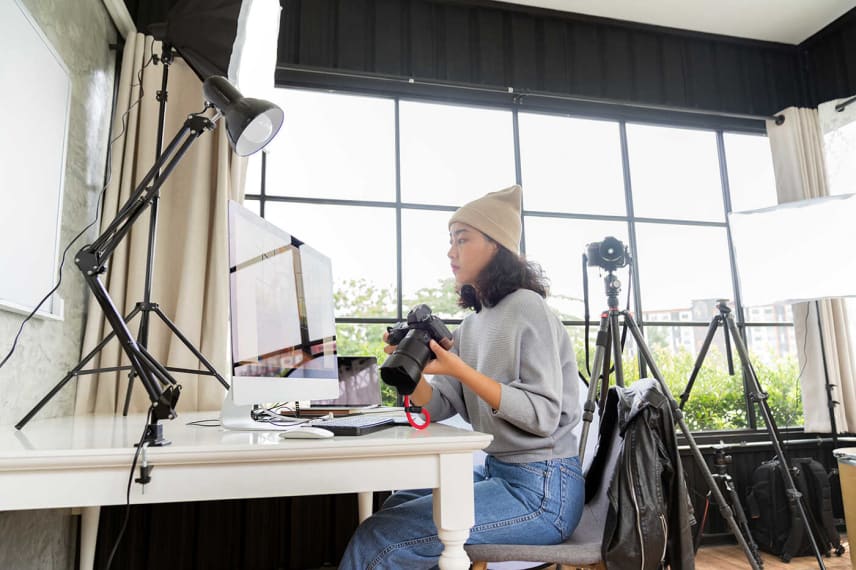Online photography degrees prepare learners for careers as photographers in both corporate and nonprofit environments. Some photographers work as artists or small business owners. They conduct their work both indoors and outdoors using film and digital cameras.
The most successful photographers possess strong technical skills and creativity. They may travel around the world for photo shoots or start their own photography businesses. Photographers with a science background can even work in a scientific laboratory.
The Bureau of Labor Statistics (BLS) projects a 4% decline in photography jobs between 2019-2029. However, some specialized roles continue to grow. Technical expertise in drone photography remains in high demand. Photographers as a whole earn a median salary of $41,280 per year.
AffordableCollegesOnline.org is an advertising-supported site. Featured or trusted partner programs and all school search, finder, or match results are for schools that compensate us. This compensation does not influence our school rankings, resource guides, or other editorially-independent information published on this site.
Featured Online Programs
Find a program that meets your affordability, flexibility, and education needs through an accredited, online school.
Photography Students FAQ's
What jobs can I get with a photography degree?
An online photography program trains students to work as professional photographers in several industries. Some individuals focus on specific subfields, such as portraiture.
How long does it take to get a photography degree?
An online photography degree typically takes 2-4 years to complete.
Is photography a good career?
A photography career may suit individuals who value creativity. Photographers who master specialized technical skills may qualify for more jobs.
How do I start my photography career?
Most photographers start with a passion for photography, a good camera, and a willingness to master technique. An online photography degree can help job seekers jumpstart their careers.
Why Get a Photography Degree?
Online photography programs offer many benefits. Photography degrees help learners master technical skills faster. They also provide a supportive environment for developing creativity. In addition, photography students receive feedback from practicing photographers.
Although some photography roles do not require a degree, many jobs expect candidates to possess an undergraduate degree in photography or fine arts. Photography degrees can increase earning potential.
Many students decide to complete a photography degree online. Virtual programs tend to cost less than in-person degrees. This added benefit enables learners to complete their degrees at their own pace.
How Much Does a Photography Degree Cost?
Online photography program costs vary depending on school type and location. Public colleges generally charge less in tuition compared to private universities. Attending an in-state school tends to cost less than an out-of-state school. Universities in urban areas may charge more than those in rural areas.
Students who complete a photography degree online usually spend less overall. Online photography degrees feature affordable tuition and often take less time to complete. Some schools allow online learners to pay in-state tuition rates, even if attending from out-of-state.
Most schools charge technology fees for online programs, but an online degree's total cost usually remains lower than that of face-to-face programs. Photography programs may expect learners to pay for studio time or supplies. Prospective students should check with individual schools to find out more about tuition and fees.
Break down your current financial situation, and receive a college tuition estimate you can afford to pay.
How Much Do Photography Majors Make?
Photographers make a median salary of around $40,000 per year, according to the BLS. This translates to approximately $20 per hour. The most experienced photographers command over $40 per hour. Specialists in drone photography can make more depending on job type, location, and level of responsibility.
Many photographers start their own businesses. They serve their communities as artists and take portraits for schools or weddings. Photographers who master photo editing and graphic design techniques can also earn more designing consumer products. Some professionals sell their photos to companies who resell those photos as stock images.
Photography degree-holders may pursue professional certifications or further education at the master's level. These opportunities increase earning potential and provide job seekers with more desirable qualifications. Experienced photographers may also teach their skills to children or adults in community centers. Some teach in college-level photography programs.
Courses in Photography Programs
Online photography degrees include both core and specialized courses. Students take introductory classes in visual design, color theory, and art history. Some programs also require enrollees to complete drawing courses.
Specialized photography courses help degree-seekers gain the skills necessary to thrive in a photography career. Digital imaging and video classes teach learners to work in cutting-edge media. Additional specialized topics include lighting application, black and white techniques, and fashion photography.
Most online photography programs expect enrollees to assemble a portfolio of work through a capstone or internship experience. Some schools ask students to display their accomplishments in a local gallery or studio as part of a practicum.
Digital Photography
This course introduces the primary techniques in digital photography. Participants study digital imaging's commercial and aesthetic uses and learn to operate industry-standard digital cameras. The project-based class helps enrollees gain foundational skills including digital editing, camera control, and sequencing. The course may also include workshops.Lighting Applications
Class participants learn the fundamentals of lighting for photography. The class explores lighting for portraiture and product photography. It covers light placement, modification, and lighting ratios. Learners practice both indoor and outdoor photography. This course serves as an essential introduction to photographic lighting.Advertising Photography
Many photographers pursue careers in marketing and digital asset management. This course provides students with training in advertising photography. Learners explore how to craft images that increase product demand. Degree-seekers master post-production techniques for enhancing images in a commercial setting. Coursework typically covers marketing basics in addition to techniques.
Certifications and Licensure for Photography Students
Photography professionals wanting to advance their careers often pursue specialized certifications. Professional certifications provide photographers with in-demand credentials and enable practicing photographers to gain additional skills.
Candidates typically take an exam to qualify for certifications. Some programs require relevant work experience and a portfolio. The list below highlights three certification programs for photographers.
The FAA hosts a certification program for professionals wanting to specialize in drone photography. Commercial drone operation in the U.S. requires a license. Photographers looking to break into the field need to obtain the FAA's certification. The program requires an exam and drone registration.
PPA sponsors an industry-standard certification program for practicing photographers. The program includes a test and portfolio review. Candidates choose from both in-person and online exam options. Certified photographers renew their certification each year.
The Ophthalmic Photographers' Society runs a certification program for photographers specializing in photographic eye imaging. Requirements include a written exam, CPR training, employment verification letter, and a portfolio submission. Candidates must also complete a performance exam.
Scholarships for Photography Students
Students pursuing a photography degree online qualify for many scholarships. These awards help learners pay for college tuition and fees. Individual programs may host institutional scholarships or fellowships for photography majors. Degree-seekers may also find financial aid through state grants and federal student loans. The following list features three scholarship opportunities for photography majors.
Scholarships for Photography Students
| Scholarship |
Amount |
Who Can Apply |
James Alan Cox Foundation Scholarship |
$2,500 |
The James Alan Cox Foundation sponsors several annual scholarships for photography students. The award supports learners who intend to specialize in photojournalism. Applicants must submit transcripts, recommendation letters, an essay, and photo samples. |
Ocho Cares Artistry Scholarship |
Varies |
This scholarship supports learners specializing in art, including photographers. Both high school and undergraduate students may apply for this opportunity. Application requirements include an essay. |
National Association of Hispanic Journalists/Getty Images Inclusion Scholarship |
$10,000 |
NAHJ sponsors this annual award in collaboration with Getty Images. Hispanic students attending an accredited school for photography may apply. Completed applications must include a resume, reference letters, transcripts, work samples, and an essay. |
Online Photography Programs
#1 Online Photography Degrees
Savannah College of Art and Design
- Savannah, GA
- 4 years
- Online + Campus
Learners seeking an online photography degree benefit from the flexibility of the BFA in photography at Savannah College of Art and Design. Working students can benefit from the online program's flexible scheduling options. Bachelor's graduates often secure entry-level positions to gain experience before pursuing career advancement.
While completing core coursework, degree-seekers in the photography program gain transferable skills they can apply to a variety of professional roles. Degree candidates can customize the curriculum through elective coursework. Students also take general education classes. Learners consult with faculty mentors to select courses based on their professional goals.
The private institution delivers 19 online programs, with 64 total programs available. The school offers five bachelor's programs for online degree-seekers. The institution holds accreditation, which means students can submit the FAFSA and determine whether they qualify for federal financial aid.
Percent Online Enrollment
20%
Percentage of all students who are enrolled online.
Accreditation
Yes
Southern Association of Colleges and Schools Commission on Colleges
#2 Online Photography Degrees
Southern New Hampshire University
- Manchester, NH
- 4 years
- Online + Campus
Degree-seekers at private Southern New Hampshire University can attend classes in person or online. The school delivers 84 online programs, with 134 total programs available. Students who aspire to careers in photography can enroll in the flexible bachelor's in digital photography program.
Learners complete core courses, general education requirements, and upper-division classes. Electives and experiential learning opportunities help degree-seekers gain skills they can apply to photography careers. Undergraduates and alumni can receive online advising from faculty advisors and career counselors.
Enrollees at the accredited institution can qualify for federal grants and loans. The program website provides specific application details, including requirements and start dates.
Southern New Hampshire University Numbers:
Total Bachelor's Programs: 62
Online Bachelor's Programs: 35
Number of Online Students: 106,762
Student Acceptance Rate: 88%
Graduation Rate: 44%
Average Cost Per Credit: 465
Transfer Credits Toward Degree: Yes
Students Enrolled
113,514
Percent Online Enrollment
94%
Percentage of all students who are enrolled online.
Accreditation
Yes
New England Commission on Higher Education

 Reviewed by
Reviewed by
